Corporate Events Management: Analysis of Planning and Promotion Report
VerifiedAdded on 2023/01/11
|11
|3926
|88
Report
AI Summary
This report provides a detailed analysis of corporate event management, focusing on the strategies and processes involved in planning and executing various types of events. It begins by defining event management and highlighting its importance in achieving business goals. The report then explores different types of corporate events, such as exhibitions, sales meetings, and product launches, comparing and contrasting them with leisure events. Key differences in planning, content, and promotion are evaluated. The report also assesses how different corporate events align with strategic objectives, examining the criteria for identifying target audiences and the elements of a feasibility study. Finally, it outlines the planning and promotional principles for a corporate event, evaluating the overall process. The report uses the context of Seven Events, a London and Birmingham-based event management company, to illustrate these concepts, providing a practical understanding of corporate event management.
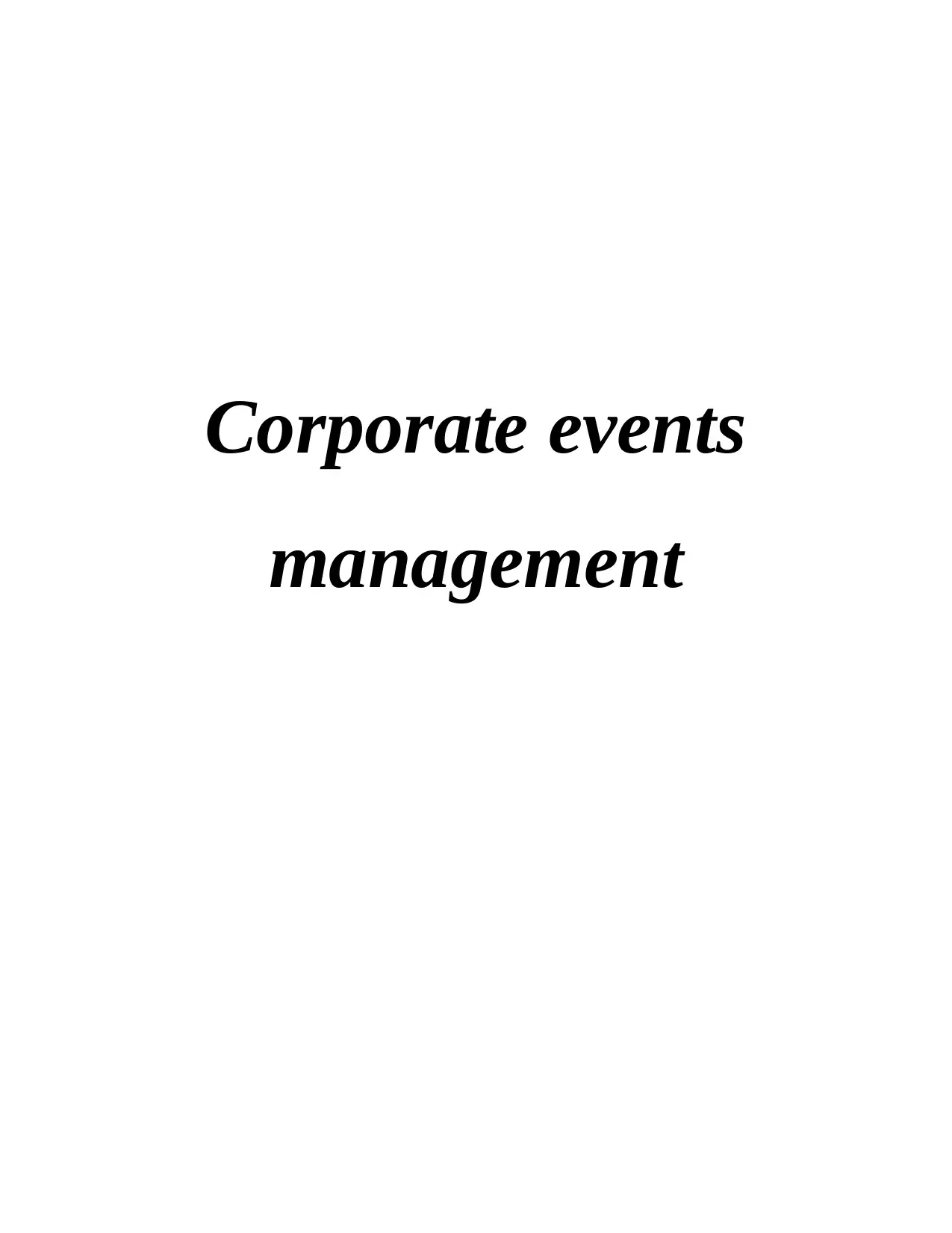
Corporate events
management
management
Paraphrase This Document
Need a fresh take? Get an instant paraphrase of this document with our AI Paraphraser
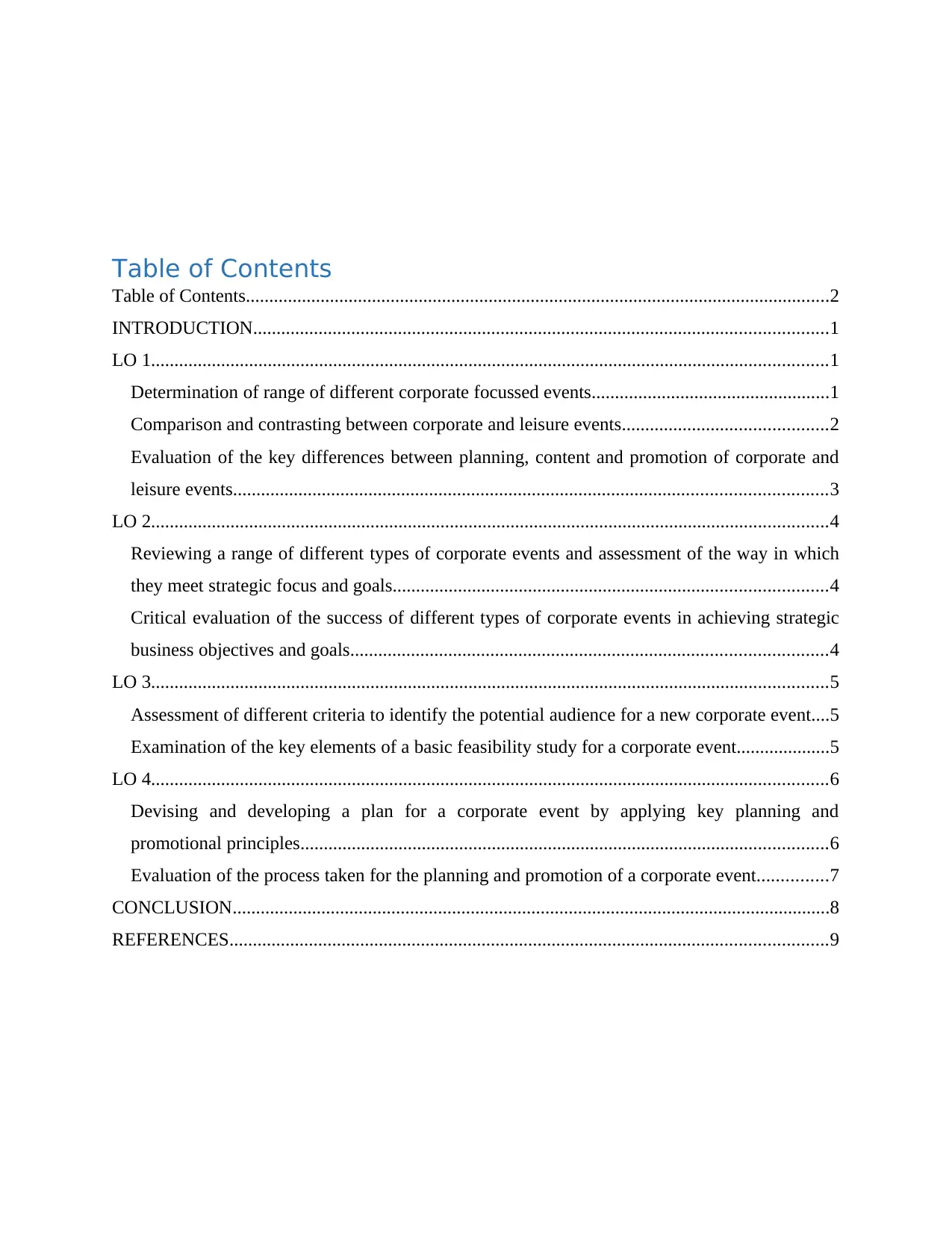
Table of Contents
Table of Contents.............................................................................................................................2
INTRODUCTION...........................................................................................................................1
LO 1.................................................................................................................................................1
Determination of range of different corporate focussed events...................................................1
Comparison and contrasting between corporate and leisure events............................................2
Evaluation of the key differences between planning, content and promotion of corporate and
leisure events...............................................................................................................................3
LO 2.................................................................................................................................................4
Reviewing a range of different types of corporate events and assessment of the way in which
they meet strategic focus and goals.............................................................................................4
Critical evaluation of the success of different types of corporate events in achieving strategic
business objectives and goals......................................................................................................4
LO 3.................................................................................................................................................5
Assessment of different criteria to identify the potential audience for a new corporate event....5
Examination of the key elements of a basic feasibility study for a corporate event....................5
LO 4.................................................................................................................................................6
Devising and developing a plan for a corporate event by applying key planning and
promotional principles.................................................................................................................6
Evaluation of the process taken for the planning and promotion of a corporate event...............7
CONCLUSION................................................................................................................................8
REFERENCES................................................................................................................................9
Table of Contents.............................................................................................................................2
INTRODUCTION...........................................................................................................................1
LO 1.................................................................................................................................................1
Determination of range of different corporate focussed events...................................................1
Comparison and contrasting between corporate and leisure events............................................2
Evaluation of the key differences between planning, content and promotion of corporate and
leisure events...............................................................................................................................3
LO 2.................................................................................................................................................4
Reviewing a range of different types of corporate events and assessment of the way in which
they meet strategic focus and goals.............................................................................................4
Critical evaluation of the success of different types of corporate events in achieving strategic
business objectives and goals......................................................................................................4
LO 3.................................................................................................................................................5
Assessment of different criteria to identify the potential audience for a new corporate event....5
Examination of the key elements of a basic feasibility study for a corporate event....................5
LO 4.................................................................................................................................................6
Devising and developing a plan for a corporate event by applying key planning and
promotional principles.................................................................................................................6
Evaluation of the process taken for the planning and promotion of a corporate event...............7
CONCLUSION................................................................................................................................8
REFERENCES................................................................................................................................9
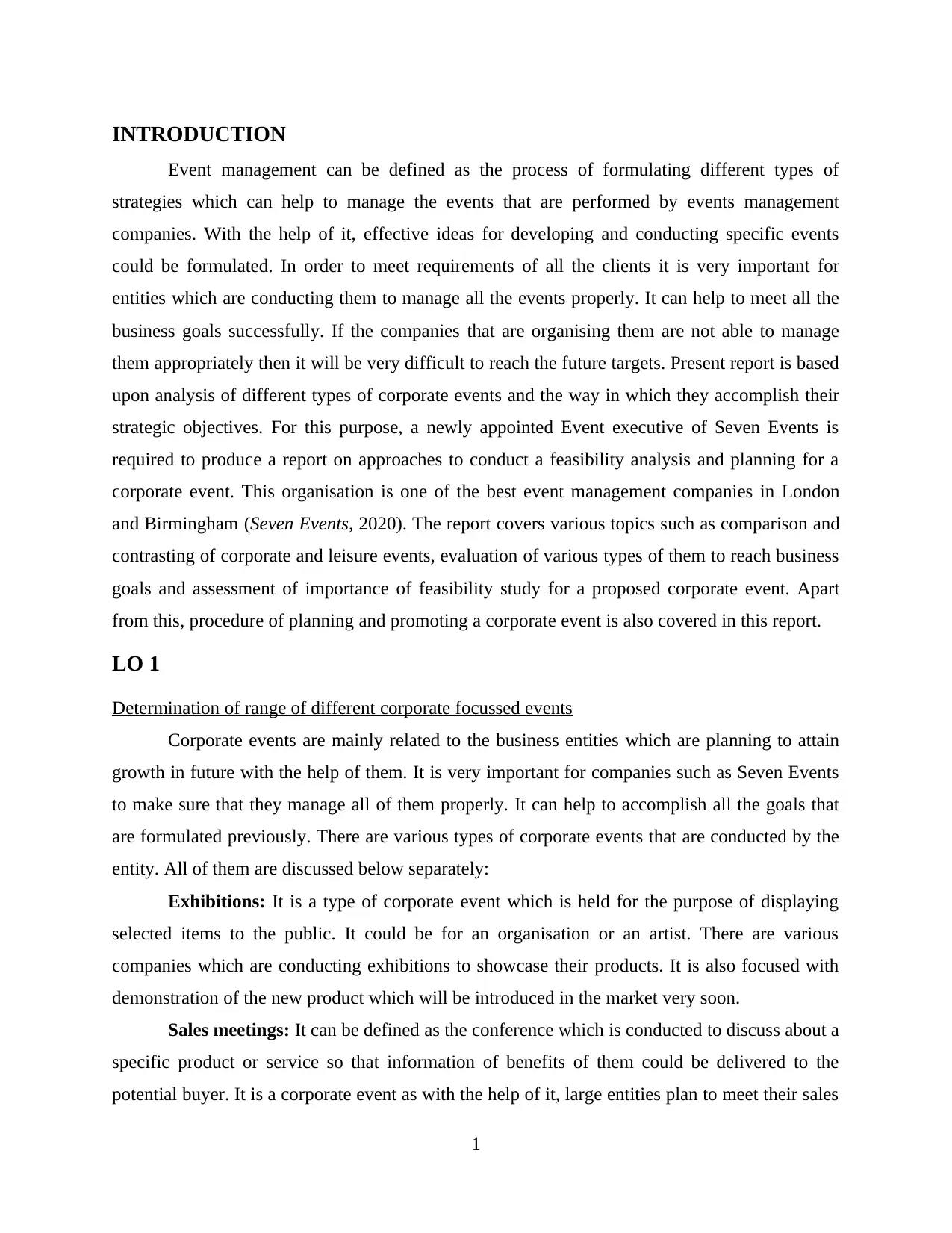
INTRODUCTION
Event management can be defined as the process of formulating different types of
strategies which can help to manage the events that are performed by events management
companies. With the help of it, effective ideas for developing and conducting specific events
could be formulated. In order to meet requirements of all the clients it is very important for
entities which are conducting them to manage all the events properly. It can help to meet all the
business goals successfully. If the companies that are organising them are not able to manage
them appropriately then it will be very difficult to reach the future targets. Present report is based
upon analysis of different types of corporate events and the way in which they accomplish their
strategic objectives. For this purpose, a newly appointed Event executive of Seven Events is
required to produce a report on approaches to conduct a feasibility analysis and planning for a
corporate event. This organisation is one of the best event management companies in London
and Birmingham (Seven Events, 2020). The report covers various topics such as comparison and
contrasting of corporate and leisure events, evaluation of various types of them to reach business
goals and assessment of importance of feasibility study for a proposed corporate event. Apart
from this, procedure of planning and promoting a corporate event is also covered in this report.
LO 1
Determination of range of different corporate focussed events
Corporate events are mainly related to the business entities which are planning to attain
growth in future with the help of them. It is very important for companies such as Seven Events
to make sure that they manage all of them properly. It can help to accomplish all the goals that
are formulated previously. There are various types of corporate events that are conducted by the
entity. All of them are discussed below separately:
Exhibitions: It is a type of corporate event which is held for the purpose of displaying
selected items to the public. It could be for an organisation or an artist. There are various
companies which are conducting exhibitions to showcase their products. It is also focused with
demonstration of the new product which will be introduced in the market very soon.
Sales meetings: It can be defined as the conference which is conducted to discuss about a
specific product or service so that information of benefits of them could be delivered to the
potential buyer. It is a corporate event as with the help of it, large entities plan to meet their sales
1
Event management can be defined as the process of formulating different types of
strategies which can help to manage the events that are performed by events management
companies. With the help of it, effective ideas for developing and conducting specific events
could be formulated. In order to meet requirements of all the clients it is very important for
entities which are conducting them to manage all the events properly. It can help to meet all the
business goals successfully. If the companies that are organising them are not able to manage
them appropriately then it will be very difficult to reach the future targets. Present report is based
upon analysis of different types of corporate events and the way in which they accomplish their
strategic objectives. For this purpose, a newly appointed Event executive of Seven Events is
required to produce a report on approaches to conduct a feasibility analysis and planning for a
corporate event. This organisation is one of the best event management companies in London
and Birmingham (Seven Events, 2020). The report covers various topics such as comparison and
contrasting of corporate and leisure events, evaluation of various types of them to reach business
goals and assessment of importance of feasibility study for a proposed corporate event. Apart
from this, procedure of planning and promoting a corporate event is also covered in this report.
LO 1
Determination of range of different corporate focussed events
Corporate events are mainly related to the business entities which are planning to attain
growth in future with the help of them. It is very important for companies such as Seven Events
to make sure that they manage all of them properly. It can help to accomplish all the goals that
are formulated previously. There are various types of corporate events that are conducted by the
entity. All of them are discussed below separately:
Exhibitions: It is a type of corporate event which is held for the purpose of displaying
selected items to the public. It could be for an organisation or an artist. There are various
companies which are conducting exhibitions to showcase their products. It is also focused with
demonstration of the new product which will be introduced in the market very soon.
Sales meetings: It can be defined as the conference which is conducted to discuss about a
specific product or service so that information of benefits of them could be delivered to the
potential buyer. It is a corporate event as with the help of it, large entities plan to meet their sales
1
⊘ This is a preview!⊘
Do you want full access?
Subscribe today to unlock all pages.

Trusted by 1+ million students worldwide
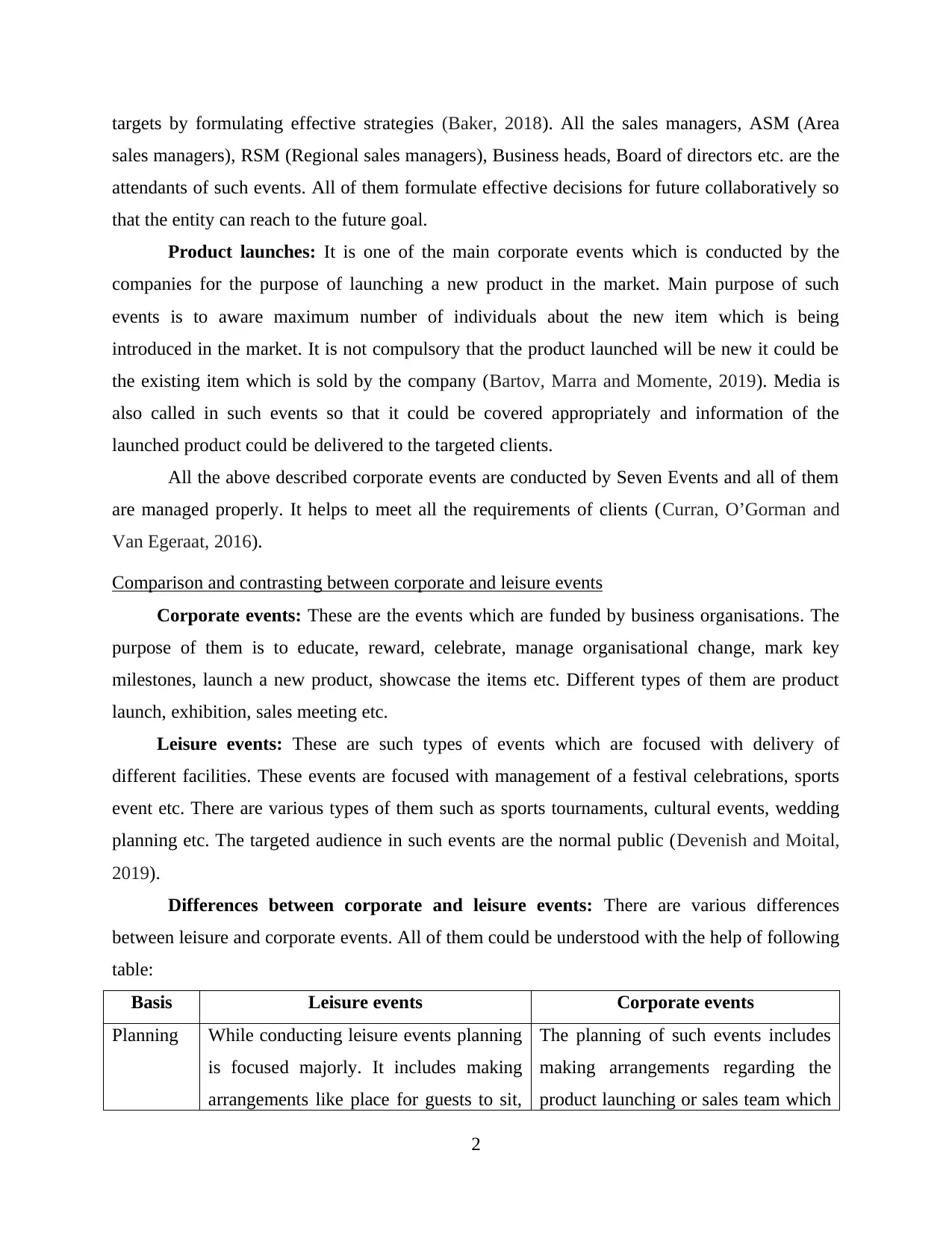
targets by formulating effective strategies (Baker, 2018). All the sales managers, ASM (Area
sales managers), RSM (Regional sales managers), Business heads, Board of directors etc. are the
attendants of such events. All of them formulate effective decisions for future collaboratively so
that the entity can reach to the future goal.
Product launches: It is one of the main corporate events which is conducted by the
companies for the purpose of launching a new product in the market. Main purpose of such
events is to aware maximum number of individuals about the new item which is being
introduced in the market. It is not compulsory that the product launched will be new it could be
the existing item which is sold by the company (Bartov, Marra and Momente, 2019). Media is
also called in such events so that it could be covered appropriately and information of the
launched product could be delivered to the targeted clients.
All the above described corporate events are conducted by Seven Events and all of them
are managed properly. It helps to meet all the requirements of clients (Curran, O’Gorman and
Van Egeraat, 2016).
Comparison and contrasting between corporate and leisure events
Corporate events: These are the events which are funded by business organisations. The
purpose of them is to educate, reward, celebrate, manage organisational change, mark key
milestones, launch a new product, showcase the items etc. Different types of them are product
launch, exhibition, sales meeting etc.
Leisure events: These are such types of events which are focused with delivery of
different facilities. These events are focused with management of a festival celebrations, sports
event etc. There are various types of them such as sports tournaments, cultural events, wedding
planning etc. The targeted audience in such events are the normal public (Devenish and Moital,
2019).
Differences between corporate and leisure events: There are various differences
between leisure and corporate events. All of them could be understood with the help of following
table:
Basis Leisure events Corporate events
Planning While conducting leisure events planning
is focused majorly. It includes making
arrangements like place for guests to sit,
The planning of such events includes
making arrangements regarding the
product launching or sales team which
2
sales managers), RSM (Regional sales managers), Business heads, Board of directors etc. are the
attendants of such events. All of them formulate effective decisions for future collaboratively so
that the entity can reach to the future goal.
Product launches: It is one of the main corporate events which is conducted by the
companies for the purpose of launching a new product in the market. Main purpose of such
events is to aware maximum number of individuals about the new item which is being
introduced in the market. It is not compulsory that the product launched will be new it could be
the existing item which is sold by the company (Bartov, Marra and Momente, 2019). Media is
also called in such events so that it could be covered appropriately and information of the
launched product could be delivered to the targeted clients.
All the above described corporate events are conducted by Seven Events and all of them
are managed properly. It helps to meet all the requirements of clients (Curran, O’Gorman and
Van Egeraat, 2016).
Comparison and contrasting between corporate and leisure events
Corporate events: These are the events which are funded by business organisations. The
purpose of them is to educate, reward, celebrate, manage organisational change, mark key
milestones, launch a new product, showcase the items etc. Different types of them are product
launch, exhibition, sales meeting etc.
Leisure events: These are such types of events which are focused with delivery of
different facilities. These events are focused with management of a festival celebrations, sports
event etc. There are various types of them such as sports tournaments, cultural events, wedding
planning etc. The targeted audience in such events are the normal public (Devenish and Moital,
2019).
Differences between corporate and leisure events: There are various differences
between leisure and corporate events. All of them could be understood with the help of following
table:
Basis Leisure events Corporate events
Planning While conducting leisure events planning
is focused majorly. It includes making
arrangements like place for guests to sit,
The planning of such events includes
making arrangements regarding the
product launching or sales team which
2
Paraphrase This Document
Need a fresh take? Get an instant paraphrase of this document with our AI Paraphraser
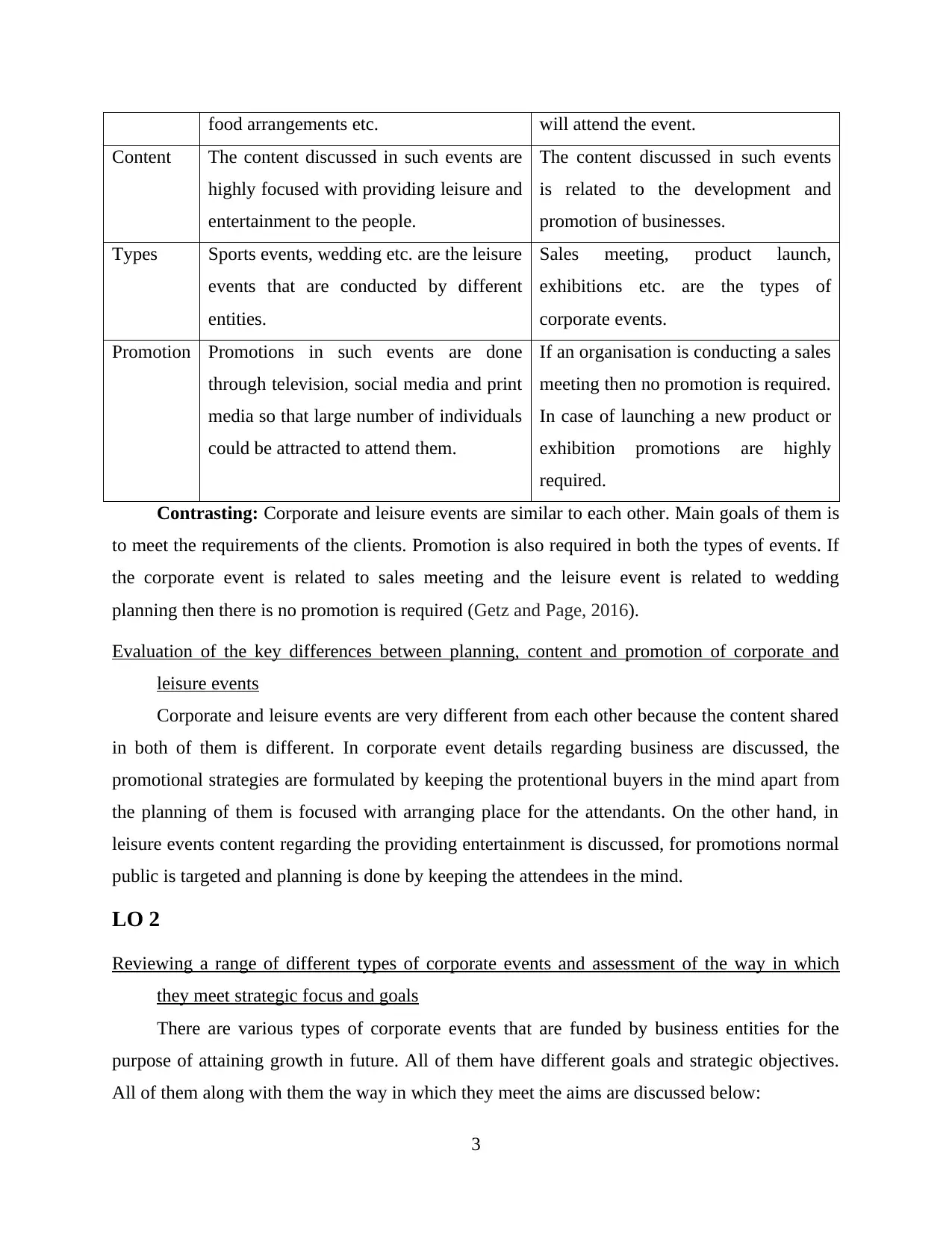
food arrangements etc. will attend the event.
Content The content discussed in such events are
highly focused with providing leisure and
entertainment to the people.
The content discussed in such events
is related to the development and
promotion of businesses.
Types Sports events, wedding etc. are the leisure
events that are conducted by different
entities.
Sales meeting, product launch,
exhibitions etc. are the types of
corporate events.
Promotion Promotions in such events are done
through television, social media and print
media so that large number of individuals
could be attracted to attend them.
If an organisation is conducting a sales
meeting then no promotion is required.
In case of launching a new product or
exhibition promotions are highly
required.
Contrasting: Corporate and leisure events are similar to each other. Main goals of them is
to meet the requirements of the clients. Promotion is also required in both the types of events. If
the corporate event is related to sales meeting and the leisure event is related to wedding
planning then there is no promotion is required (Getz and Page, 2016).
Evaluation of the key differences between planning, content and promotion of corporate and
leisure events
Corporate and leisure events are very different from each other because the content shared
in both of them is different. In corporate event details regarding business are discussed, the
promotional strategies are formulated by keeping the protentional buyers in the mind apart from
the planning of them is focused with arranging place for the attendants. On the other hand, in
leisure events content regarding the providing entertainment is discussed, for promotions normal
public is targeted and planning is done by keeping the attendees in the mind.
LO 2
Reviewing a range of different types of corporate events and assessment of the way in which
they meet strategic focus and goals
There are various types of corporate events that are funded by business entities for the
purpose of attaining growth in future. All of them have different goals and strategic objectives.
All of them along with them the way in which they meet the aims are discussed below:
3
Content The content discussed in such events are
highly focused with providing leisure and
entertainment to the people.
The content discussed in such events
is related to the development and
promotion of businesses.
Types Sports events, wedding etc. are the leisure
events that are conducted by different
entities.
Sales meeting, product launch,
exhibitions etc. are the types of
corporate events.
Promotion Promotions in such events are done
through television, social media and print
media so that large number of individuals
could be attracted to attend them.
If an organisation is conducting a sales
meeting then no promotion is required.
In case of launching a new product or
exhibition promotions are highly
required.
Contrasting: Corporate and leisure events are similar to each other. Main goals of them is
to meet the requirements of the clients. Promotion is also required in both the types of events. If
the corporate event is related to sales meeting and the leisure event is related to wedding
planning then there is no promotion is required (Getz and Page, 2016).
Evaluation of the key differences between planning, content and promotion of corporate and
leisure events
Corporate and leisure events are very different from each other because the content shared
in both of them is different. In corporate event details regarding business are discussed, the
promotional strategies are formulated by keeping the protentional buyers in the mind apart from
the planning of them is focused with arranging place for the attendants. On the other hand, in
leisure events content regarding the providing entertainment is discussed, for promotions normal
public is targeted and planning is done by keeping the attendees in the mind.
LO 2
Reviewing a range of different types of corporate events and assessment of the way in which
they meet strategic focus and goals
There are various types of corporate events that are funded by business entities for the
purpose of attaining growth in future. All of them have different goals and strategic objectives.
All of them along with them the way in which they meet the aims are discussed below:
3
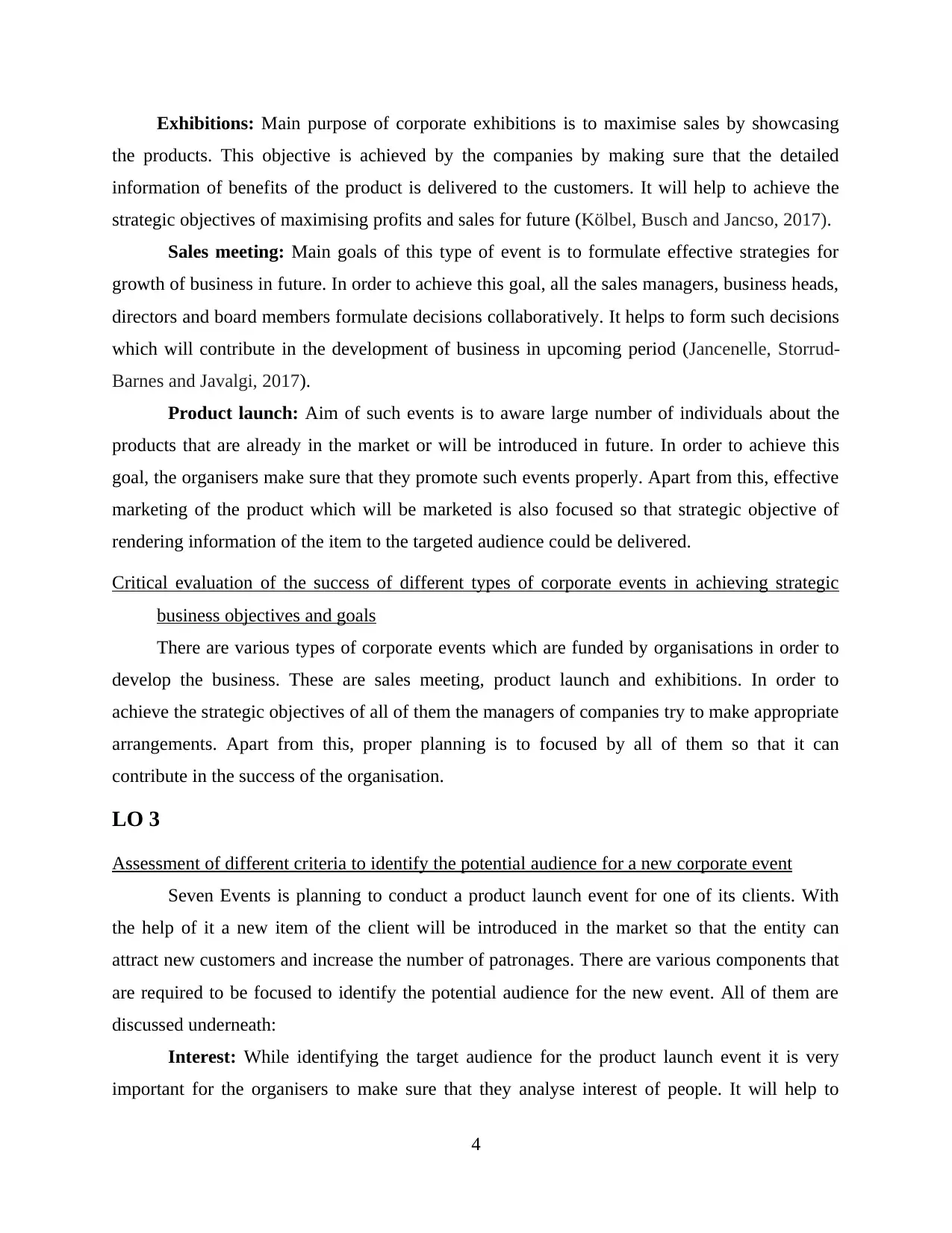
Exhibitions: Main purpose of corporate exhibitions is to maximise sales by showcasing
the products. This objective is achieved by the companies by making sure that the detailed
information of benefits of the product is delivered to the customers. It will help to achieve the
strategic objectives of maximising profits and sales for future (Kölbel, Busch and Jancso, 2017).
Sales meeting: Main goals of this type of event is to formulate effective strategies for
growth of business in future. In order to achieve this goal, all the sales managers, business heads,
directors and board members formulate decisions collaboratively. It helps to form such decisions
which will contribute in the development of business in upcoming period (Jancenelle, Storrud-
Barnes and Javalgi, 2017).
Product launch: Aim of such events is to aware large number of individuals about the
products that are already in the market or will be introduced in future. In order to achieve this
goal, the organisers make sure that they promote such events properly. Apart from this, effective
marketing of the product which will be marketed is also focused so that strategic objective of
rendering information of the item to the targeted audience could be delivered.
Critical evaluation of the success of different types of corporate events in achieving strategic
business objectives and goals
There are various types of corporate events which are funded by organisations in order to
develop the business. These are sales meeting, product launch and exhibitions. In order to
achieve the strategic objectives of all of them the managers of companies try to make appropriate
arrangements. Apart from this, proper planning is to focused by all of them so that it can
contribute in the success of the organisation.
LO 3
Assessment of different criteria to identify the potential audience for a new corporate event
Seven Events is planning to conduct a product launch event for one of its clients. With
the help of it a new item of the client will be introduced in the market so that the entity can
attract new customers and increase the number of patronages. There are various components that
are required to be focused to identify the potential audience for the new event. All of them are
discussed underneath:
Interest: While identifying the target audience for the product launch event it is very
important for the organisers to make sure that they analyse interest of people. It will help to
4
the products. This objective is achieved by the companies by making sure that the detailed
information of benefits of the product is delivered to the customers. It will help to achieve the
strategic objectives of maximising profits and sales for future (Kölbel, Busch and Jancso, 2017).
Sales meeting: Main goals of this type of event is to formulate effective strategies for
growth of business in future. In order to achieve this goal, all the sales managers, business heads,
directors and board members formulate decisions collaboratively. It helps to form such decisions
which will contribute in the development of business in upcoming period (Jancenelle, Storrud-
Barnes and Javalgi, 2017).
Product launch: Aim of such events is to aware large number of individuals about the
products that are already in the market or will be introduced in future. In order to achieve this
goal, the organisers make sure that they promote such events properly. Apart from this, effective
marketing of the product which will be marketed is also focused so that strategic objective of
rendering information of the item to the targeted audience could be delivered.
Critical evaluation of the success of different types of corporate events in achieving strategic
business objectives and goals
There are various types of corporate events which are funded by organisations in order to
develop the business. These are sales meeting, product launch and exhibitions. In order to
achieve the strategic objectives of all of them the managers of companies try to make appropriate
arrangements. Apart from this, proper planning is to focused by all of them so that it can
contribute in the success of the organisation.
LO 3
Assessment of different criteria to identify the potential audience for a new corporate event
Seven Events is planning to conduct a product launch event for one of its clients. With
the help of it a new item of the client will be introduced in the market so that the entity can
attract new customers and increase the number of patronages. There are various components that
are required to be focused to identify the potential audience for the new event. All of them are
discussed underneath:
Interest: While identifying the target audience for the product launch event it is very
important for the organisers to make sure that they analyse interest of people. It will help to
4
⊘ This is a preview!⊘
Do you want full access?
Subscribe today to unlock all pages.

Trusted by 1+ million students worldwide
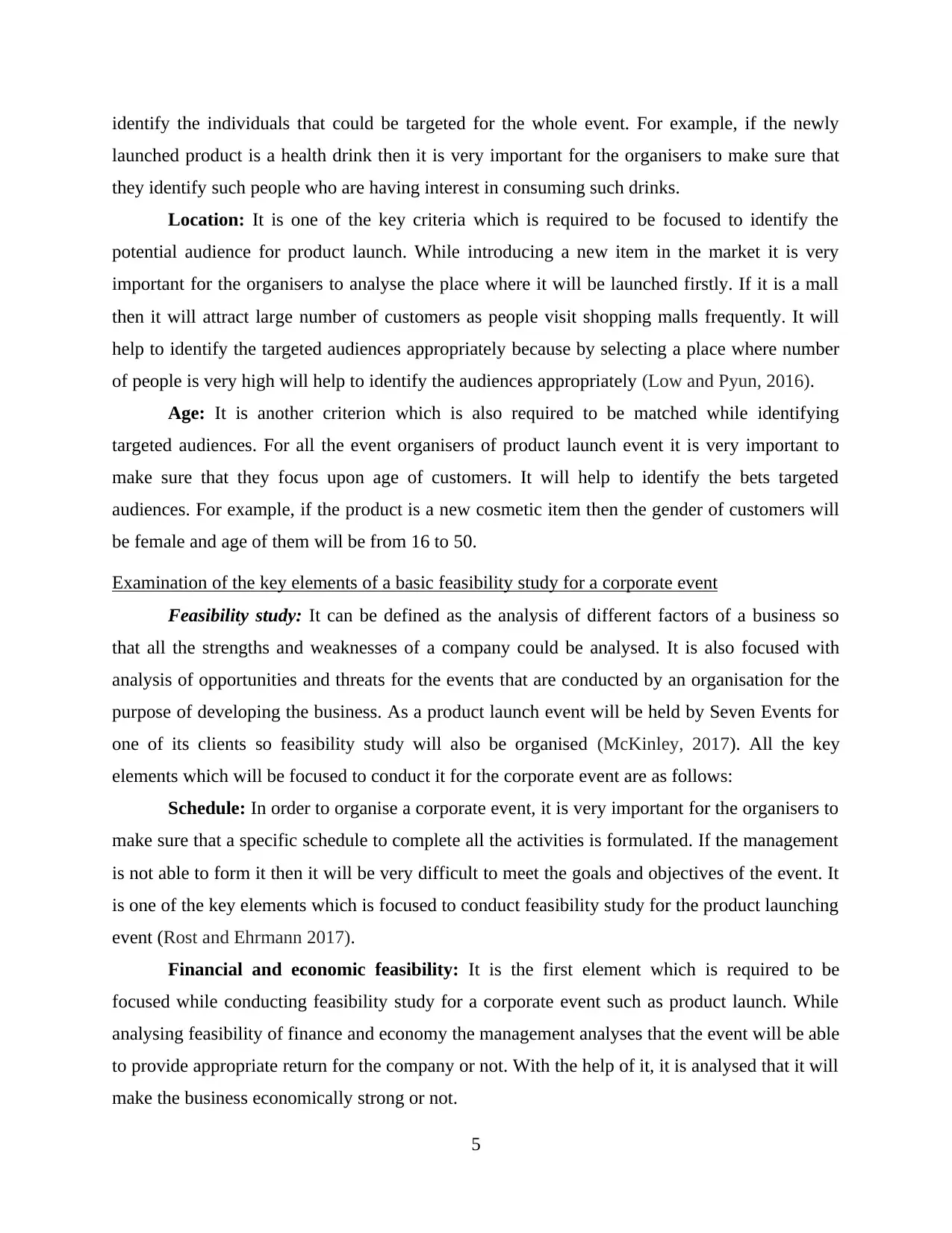
identify the individuals that could be targeted for the whole event. For example, if the newly
launched product is a health drink then it is very important for the organisers to make sure that
they identify such people who are having interest in consuming such drinks.
Location: It is one of the key criteria which is required to be focused to identify the
potential audience for product launch. While introducing a new item in the market it is very
important for the organisers to analyse the place where it will be launched firstly. If it is a mall
then it will attract large number of customers as people visit shopping malls frequently. It will
help to identify the targeted audiences appropriately because by selecting a place where number
of people is very high will help to identify the audiences appropriately (Low and Pyun, 2016).
Age: It is another criterion which is also required to be matched while identifying
targeted audiences. For all the event organisers of product launch event it is very important to
make sure that they focus upon age of customers. It will help to identify the bets targeted
audiences. For example, if the product is a new cosmetic item then the gender of customers will
be female and age of them will be from 16 to 50.
Examination of the key elements of a basic feasibility study for a corporate event
Feasibility study: It can be defined as the analysis of different factors of a business so
that all the strengths and weaknesses of a company could be analysed. It is also focused with
analysis of opportunities and threats for the events that are conducted by an organisation for the
purpose of developing the business. As a product launch event will be held by Seven Events for
one of its clients so feasibility study will also be organised (McKinley, 2017). All the key
elements which will be focused to conduct it for the corporate event are as follows:
Schedule: In order to organise a corporate event, it is very important for the organisers to
make sure that a specific schedule to complete all the activities is formulated. If the management
is not able to form it then it will be very difficult to meet the goals and objectives of the event. It
is one of the key elements which is focused to conduct feasibility study for the product launching
event (Rost and Ehrmann 2017).
Financial and economic feasibility: It is the first element which is required to be
focused while conducting feasibility study for a corporate event such as product launch. While
analysing feasibility of finance and economy the management analyses that the event will be able
to provide appropriate return for the company or not. With the help of it, it is analysed that it will
make the business economically strong or not.
5
launched product is a health drink then it is very important for the organisers to make sure that
they identify such people who are having interest in consuming such drinks.
Location: It is one of the key criteria which is required to be focused to identify the
potential audience for product launch. While introducing a new item in the market it is very
important for the organisers to analyse the place where it will be launched firstly. If it is a mall
then it will attract large number of customers as people visit shopping malls frequently. It will
help to identify the targeted audiences appropriately because by selecting a place where number
of people is very high will help to identify the audiences appropriately (Low and Pyun, 2016).
Age: It is another criterion which is also required to be matched while identifying
targeted audiences. For all the event organisers of product launch event it is very important to
make sure that they focus upon age of customers. It will help to identify the bets targeted
audiences. For example, if the product is a new cosmetic item then the gender of customers will
be female and age of them will be from 16 to 50.
Examination of the key elements of a basic feasibility study for a corporate event
Feasibility study: It can be defined as the analysis of different factors of a business so
that all the strengths and weaknesses of a company could be analysed. It is also focused with
analysis of opportunities and threats for the events that are conducted by an organisation for the
purpose of developing the business. As a product launch event will be held by Seven Events for
one of its clients so feasibility study will also be organised (McKinley, 2017). All the key
elements which will be focused to conduct it for the corporate event are as follows:
Schedule: In order to organise a corporate event, it is very important for the organisers to
make sure that a specific schedule to complete all the activities is formulated. If the management
is not able to form it then it will be very difficult to meet the goals and objectives of the event. It
is one of the key elements which is focused to conduct feasibility study for the product launching
event (Rost and Ehrmann 2017).
Financial and economic feasibility: It is the first element which is required to be
focused while conducting feasibility study for a corporate event such as product launch. While
analysing feasibility of finance and economy the management analyses that the event will be able
to provide appropriate return for the company or not. With the help of it, it is analysed that it will
make the business economically strong or not.
5
Paraphrase This Document
Need a fresh take? Get an instant paraphrase of this document with our AI Paraphraser
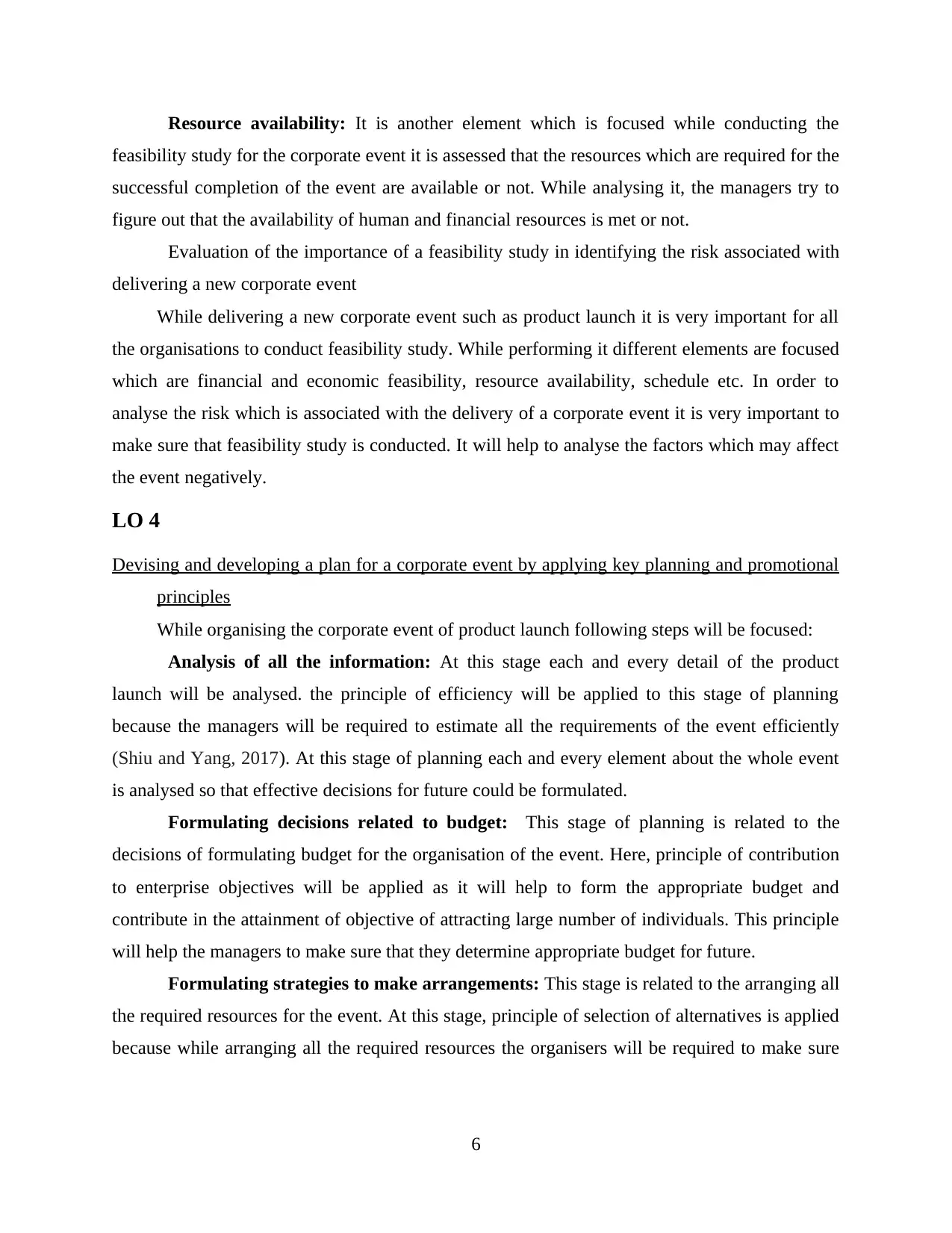
Resource availability: It is another element which is focused while conducting the
feasibility study for the corporate event it is assessed that the resources which are required for the
successful completion of the event are available or not. While analysing it, the managers try to
figure out that the availability of human and financial resources is met or not.
Evaluation of the importance of a feasibility study in identifying the risk associated with
delivering a new corporate event
While delivering a new corporate event such as product launch it is very important for all
the organisations to conduct feasibility study. While performing it different elements are focused
which are financial and economic feasibility, resource availability, schedule etc. In order to
analyse the risk which is associated with the delivery of a corporate event it is very important to
make sure that feasibility study is conducted. It will help to analyse the factors which may affect
the event negatively.
LO 4
Devising and developing a plan for a corporate event by applying key planning and promotional
principles
While organising the corporate event of product launch following steps will be focused:
Analysis of all the information: At this stage each and every detail of the product
launch will be analysed. the principle of efficiency will be applied to this stage of planning
because the managers will be required to estimate all the requirements of the event efficiently
(Shiu and Yang, 2017). At this stage of planning each and every element about the whole event
is analysed so that effective decisions for future could be formulated.
Formulating decisions related to budget: This stage of planning is related to the
decisions of formulating budget for the organisation of the event. Here, principle of contribution
to enterprise objectives will be applied as it will help to form the appropriate budget and
contribute in the attainment of objective of attracting large number of individuals. This principle
will help the managers to make sure that they determine appropriate budget for future.
Formulating strategies to make arrangements: This stage is related to the arranging all
the required resources for the event. At this stage, principle of selection of alternatives is applied
because while arranging all the required resources the organisers will be required to make sure
6
feasibility study for the corporate event it is assessed that the resources which are required for the
successful completion of the event are available or not. While analysing it, the managers try to
figure out that the availability of human and financial resources is met or not.
Evaluation of the importance of a feasibility study in identifying the risk associated with
delivering a new corporate event
While delivering a new corporate event such as product launch it is very important for all
the organisations to conduct feasibility study. While performing it different elements are focused
which are financial and economic feasibility, resource availability, schedule etc. In order to
analyse the risk which is associated with the delivery of a corporate event it is very important to
make sure that feasibility study is conducted. It will help to analyse the factors which may affect
the event negatively.
LO 4
Devising and developing a plan for a corporate event by applying key planning and promotional
principles
While organising the corporate event of product launch following steps will be focused:
Analysis of all the information: At this stage each and every detail of the product
launch will be analysed. the principle of efficiency will be applied to this stage of planning
because the managers will be required to estimate all the requirements of the event efficiently
(Shiu and Yang, 2017). At this stage of planning each and every element about the whole event
is analysed so that effective decisions for future could be formulated.
Formulating decisions related to budget: This stage of planning is related to the
decisions of formulating budget for the organisation of the event. Here, principle of contribution
to enterprise objectives will be applied as it will help to form the appropriate budget and
contribute in the attainment of objective of attracting large number of individuals. This principle
will help the managers to make sure that they determine appropriate budget for future.
Formulating strategies to make arrangements: This stage is related to the arranging all
the required resources for the event. At this stage, principle of selection of alternatives is applied
because while arranging all the required resources the organisers will be required to make sure
6
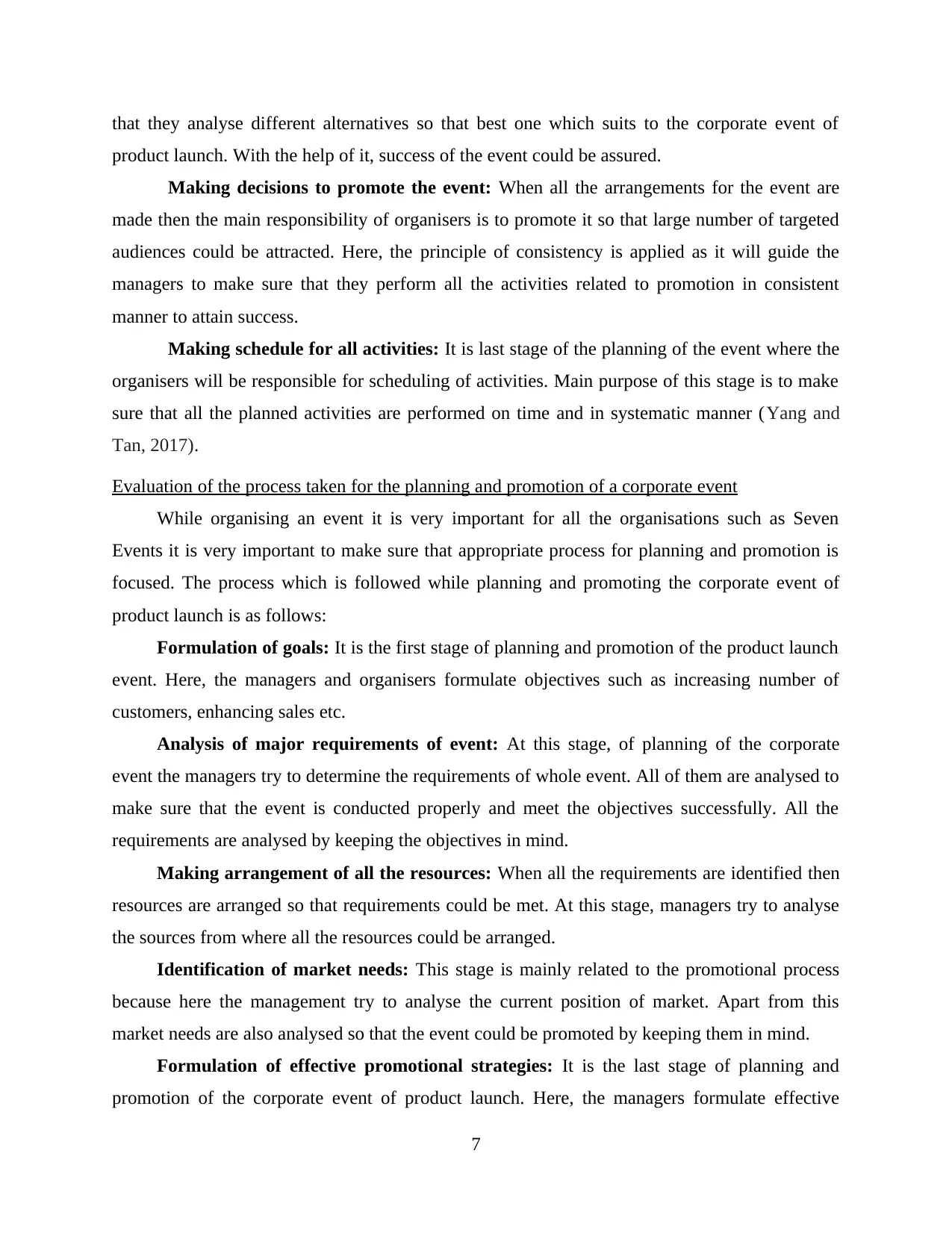
that they analyse different alternatives so that best one which suits to the corporate event of
product launch. With the help of it, success of the event could be assured.
Making decisions to promote the event: When all the arrangements for the event are
made then the main responsibility of organisers is to promote it so that large number of targeted
audiences could be attracted. Here, the principle of consistency is applied as it will guide the
managers to make sure that they perform all the activities related to promotion in consistent
manner to attain success.
Making schedule for all activities: It is last stage of the planning of the event where the
organisers will be responsible for scheduling of activities. Main purpose of this stage is to make
sure that all the planned activities are performed on time and in systematic manner (Yang and
Tan, 2017).
Evaluation of the process taken for the planning and promotion of a corporate event
While organising an event it is very important for all the organisations such as Seven
Events it is very important to make sure that appropriate process for planning and promotion is
focused. The process which is followed while planning and promoting the corporate event of
product launch is as follows:
Formulation of goals: It is the first stage of planning and promotion of the product launch
event. Here, the managers and organisers formulate objectives such as increasing number of
customers, enhancing sales etc.
Analysis of major requirements of event: At this stage, of planning of the corporate
event the managers try to determine the requirements of whole event. All of them are analysed to
make sure that the event is conducted properly and meet the objectives successfully. All the
requirements are analysed by keeping the objectives in mind.
Making arrangement of all the resources: When all the requirements are identified then
resources are arranged so that requirements could be met. At this stage, managers try to analyse
the sources from where all the resources could be arranged.
Identification of market needs: This stage is mainly related to the promotional process
because here the management try to analyse the current position of market. Apart from this
market needs are also analysed so that the event could be promoted by keeping them in mind.
Formulation of effective promotional strategies: It is the last stage of planning and
promotion of the corporate event of product launch. Here, the managers formulate effective
7
product launch. With the help of it, success of the event could be assured.
Making decisions to promote the event: When all the arrangements for the event are
made then the main responsibility of organisers is to promote it so that large number of targeted
audiences could be attracted. Here, the principle of consistency is applied as it will guide the
managers to make sure that they perform all the activities related to promotion in consistent
manner to attain success.
Making schedule for all activities: It is last stage of the planning of the event where the
organisers will be responsible for scheduling of activities. Main purpose of this stage is to make
sure that all the planned activities are performed on time and in systematic manner (Yang and
Tan, 2017).
Evaluation of the process taken for the planning and promotion of a corporate event
While organising an event it is very important for all the organisations such as Seven
Events it is very important to make sure that appropriate process for planning and promotion is
focused. The process which is followed while planning and promoting the corporate event of
product launch is as follows:
Formulation of goals: It is the first stage of planning and promotion of the product launch
event. Here, the managers and organisers formulate objectives such as increasing number of
customers, enhancing sales etc.
Analysis of major requirements of event: At this stage, of planning of the corporate
event the managers try to determine the requirements of whole event. All of them are analysed to
make sure that the event is conducted properly and meet the objectives successfully. All the
requirements are analysed by keeping the objectives in mind.
Making arrangement of all the resources: When all the requirements are identified then
resources are arranged so that requirements could be met. At this stage, managers try to analyse
the sources from where all the resources could be arranged.
Identification of market needs: This stage is mainly related to the promotional process
because here the management try to analyse the current position of market. Apart from this
market needs are also analysed so that the event could be promoted by keeping them in mind.
Formulation of effective promotional strategies: It is the last stage of planning and
promotion of the corporate event of product launch. Here, the managers formulate effective
7
⊘ This is a preview!⊘
Do you want full access?
Subscribe today to unlock all pages.

Trusted by 1+ million students worldwide
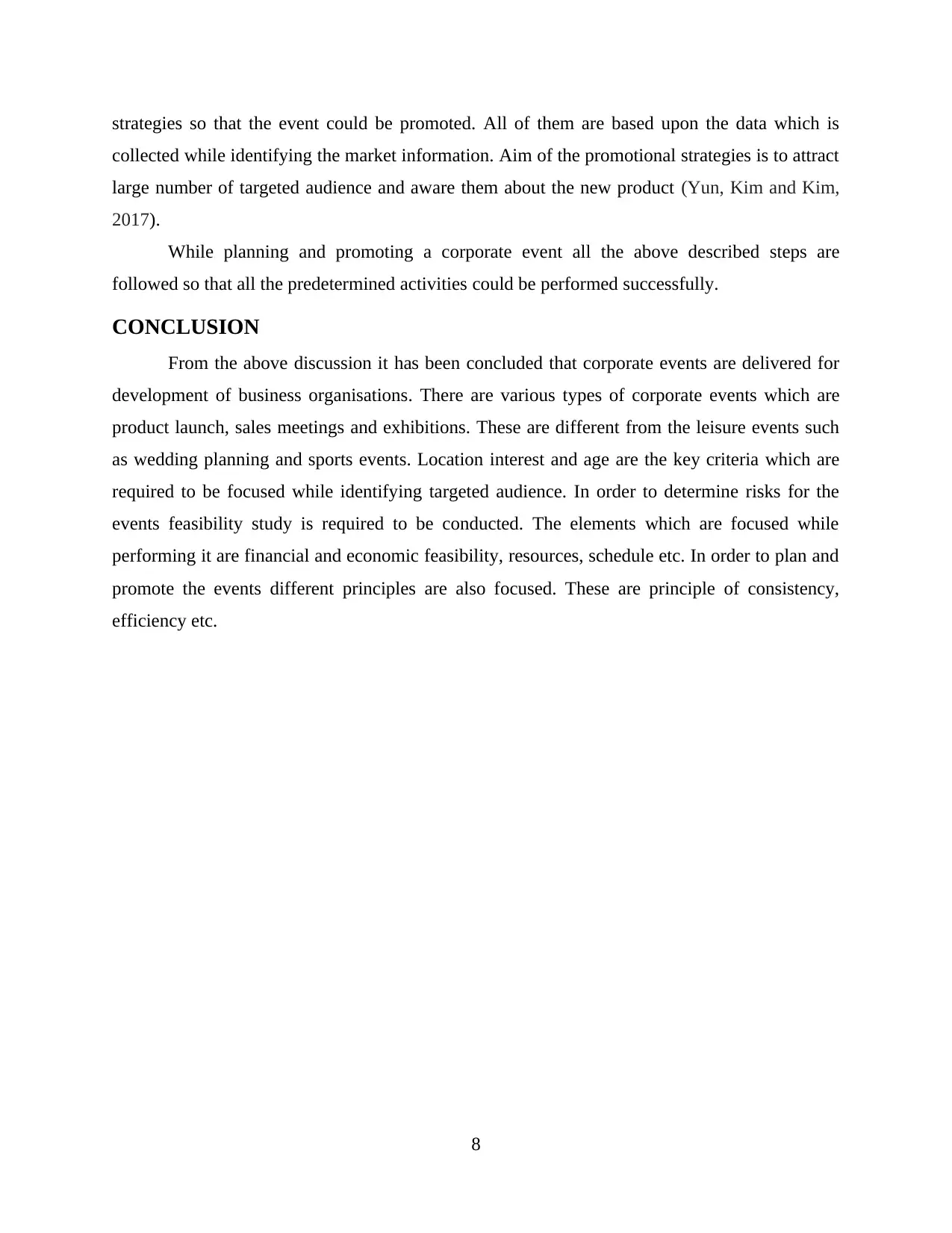
strategies so that the event could be promoted. All of them are based upon the data which is
collected while identifying the market information. Aim of the promotional strategies is to attract
large number of targeted audience and aware them about the new product (Yun, Kim and Kim,
2017).
While planning and promoting a corporate event all the above described steps are
followed so that all the predetermined activities could be performed successfully.
CONCLUSION
From the above discussion it has been concluded that corporate events are delivered for
development of business organisations. There are various types of corporate events which are
product launch, sales meetings and exhibitions. These are different from the leisure events such
as wedding planning and sports events. Location interest and age are the key criteria which are
required to be focused while identifying targeted audience. In order to determine risks for the
events feasibility study is required to be conducted. The elements which are focused while
performing it are financial and economic feasibility, resources, schedule etc. In order to plan and
promote the events different principles are also focused. These are principle of consistency,
efficiency etc.
8
collected while identifying the market information. Aim of the promotional strategies is to attract
large number of targeted audience and aware them about the new product (Yun, Kim and Kim,
2017).
While planning and promoting a corporate event all the above described steps are
followed so that all the predetermined activities could be performed successfully.
CONCLUSION
From the above discussion it has been concluded that corporate events are delivered for
development of business organisations. There are various types of corporate events which are
product launch, sales meetings and exhibitions. These are different from the leisure events such
as wedding planning and sports events. Location interest and age are the key criteria which are
required to be focused while identifying targeted audience. In order to determine risks for the
events feasibility study is required to be conducted. The elements which are focused while
performing it are financial and economic feasibility, resources, schedule etc. In order to plan and
promote the events different principles are also focused. These are principle of consistency,
efficiency etc.
8
Paraphrase This Document
Need a fresh take? Get an instant paraphrase of this document with our AI Paraphraser
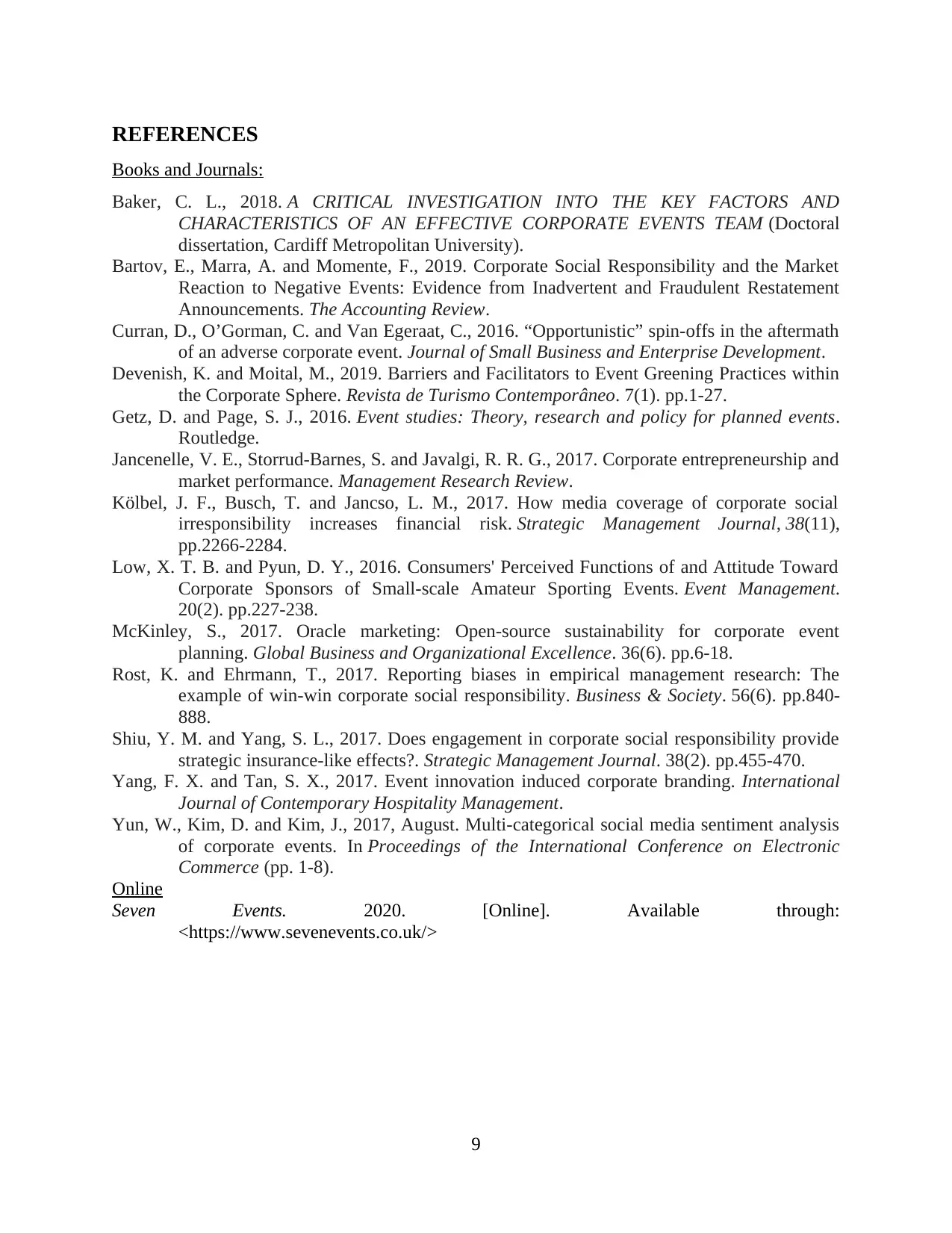
REFERENCES
Books and Journals:
Baker, C. L., 2018. A CRITICAL INVESTIGATION INTO THE KEY FACTORS AND
CHARACTERISTICS OF AN EFFECTIVE CORPORATE EVENTS TEAM (Doctoral
dissertation, Cardiff Metropolitan University).
Bartov, E., Marra, A. and Momente, F., 2019. Corporate Social Responsibility and the Market
Reaction to Negative Events: Evidence from Inadvertent and Fraudulent Restatement
Announcements. The Accounting Review.
Curran, D., O’Gorman, C. and Van Egeraat, C., 2016. “Opportunistic” spin-offs in the aftermath
of an adverse corporate event. Journal of Small Business and Enterprise Development.
Devenish, K. and Moital, M., 2019. Barriers and Facilitators to Event Greening Practices within
the Corporate Sphere. Revista de Turismo Contemporâneo. 7(1). pp.1-27.
Getz, D. and Page, S. J., 2016. Event studies: Theory, research and policy for planned events.
Routledge.
Jancenelle, V. E., Storrud-Barnes, S. and Javalgi, R. R. G., 2017. Corporate entrepreneurship and
market performance. Management Research Review.
Kölbel, J. F., Busch, T. and Jancso, L. M., 2017. How media coverage of corporate social
irresponsibility increases financial risk. Strategic Management Journal, 38(11),
pp.2266-2284.
Low, X. T. B. and Pyun, D. Y., 2016. Consumers' Perceived Functions of and Attitude Toward
Corporate Sponsors of Small-scale Amateur Sporting Events. Event Management.
20(2). pp.227-238.
McKinley, S., 2017. Oracle marketing: Open‐source sustainability for corporate event
planning. Global Business and Organizational Excellence. 36(6). pp.6-18.
Rost, K. and Ehrmann, T., 2017. Reporting biases in empirical management research: The
example of win-win corporate social responsibility. Business & Society. 56(6). pp.840-
888.
Shiu, Y. M. and Yang, S. L., 2017. Does engagement in corporate social responsibility provide
strategic insurance‐like effects?. Strategic Management Journal. 38(2). pp.455-470.
Yang, F. X. and Tan, S. X., 2017. Event innovation induced corporate branding. International
Journal of Contemporary Hospitality Management.
Yun, W., Kim, D. and Kim, J., 2017, August. Multi-categorical social media sentiment analysis
of corporate events. In Proceedings of the International Conference on Electronic
Commerce (pp. 1-8).
Online
Seven Events. 2020. [Online]. Available through:
<https://www.sevenevents.co.uk/>
9
Books and Journals:
Baker, C. L., 2018. A CRITICAL INVESTIGATION INTO THE KEY FACTORS AND
CHARACTERISTICS OF AN EFFECTIVE CORPORATE EVENTS TEAM (Doctoral
dissertation, Cardiff Metropolitan University).
Bartov, E., Marra, A. and Momente, F., 2019. Corporate Social Responsibility and the Market
Reaction to Negative Events: Evidence from Inadvertent and Fraudulent Restatement
Announcements. The Accounting Review.
Curran, D., O’Gorman, C. and Van Egeraat, C., 2016. “Opportunistic” spin-offs in the aftermath
of an adverse corporate event. Journal of Small Business and Enterprise Development.
Devenish, K. and Moital, M., 2019. Barriers and Facilitators to Event Greening Practices within
the Corporate Sphere. Revista de Turismo Contemporâneo. 7(1). pp.1-27.
Getz, D. and Page, S. J., 2016. Event studies: Theory, research and policy for planned events.
Routledge.
Jancenelle, V. E., Storrud-Barnes, S. and Javalgi, R. R. G., 2017. Corporate entrepreneurship and
market performance. Management Research Review.
Kölbel, J. F., Busch, T. and Jancso, L. M., 2017. How media coverage of corporate social
irresponsibility increases financial risk. Strategic Management Journal, 38(11),
pp.2266-2284.
Low, X. T. B. and Pyun, D. Y., 2016. Consumers' Perceived Functions of and Attitude Toward
Corporate Sponsors of Small-scale Amateur Sporting Events. Event Management.
20(2). pp.227-238.
McKinley, S., 2017. Oracle marketing: Open‐source sustainability for corporate event
planning. Global Business and Organizational Excellence. 36(6). pp.6-18.
Rost, K. and Ehrmann, T., 2017. Reporting biases in empirical management research: The
example of win-win corporate social responsibility. Business & Society. 56(6). pp.840-
888.
Shiu, Y. M. and Yang, S. L., 2017. Does engagement in corporate social responsibility provide
strategic insurance‐like effects?. Strategic Management Journal. 38(2). pp.455-470.
Yang, F. X. and Tan, S. X., 2017. Event innovation induced corporate branding. International
Journal of Contemporary Hospitality Management.
Yun, W., Kim, D. and Kim, J., 2017, August. Multi-categorical social media sentiment analysis
of corporate events. In Proceedings of the International Conference on Electronic
Commerce (pp. 1-8).
Online
Seven Events. 2020. [Online]. Available through:
<https://www.sevenevents.co.uk/>
9
1 out of 11
Related Documents
Your All-in-One AI-Powered Toolkit for Academic Success.
+13062052269
info@desklib.com
Available 24*7 on WhatsApp / Email
![[object Object]](/_next/static/media/star-bottom.7253800d.svg)
Unlock your academic potential
Copyright © 2020–2026 A2Z Services. All Rights Reserved. Developed and managed by ZUCOL.





